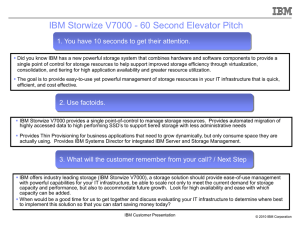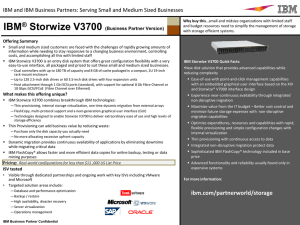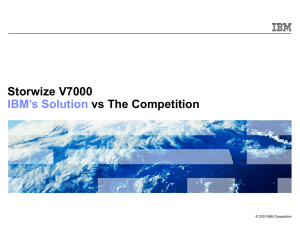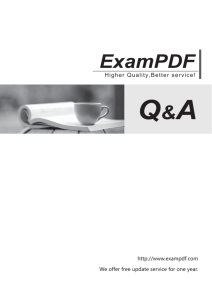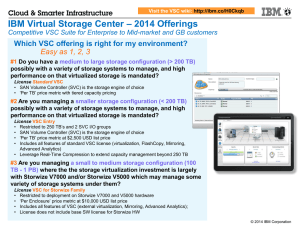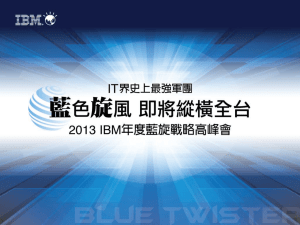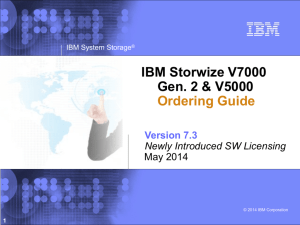Red paper Simple Configuration Example for Storwize V7000 FlashCopy and PowerHA
advertisement
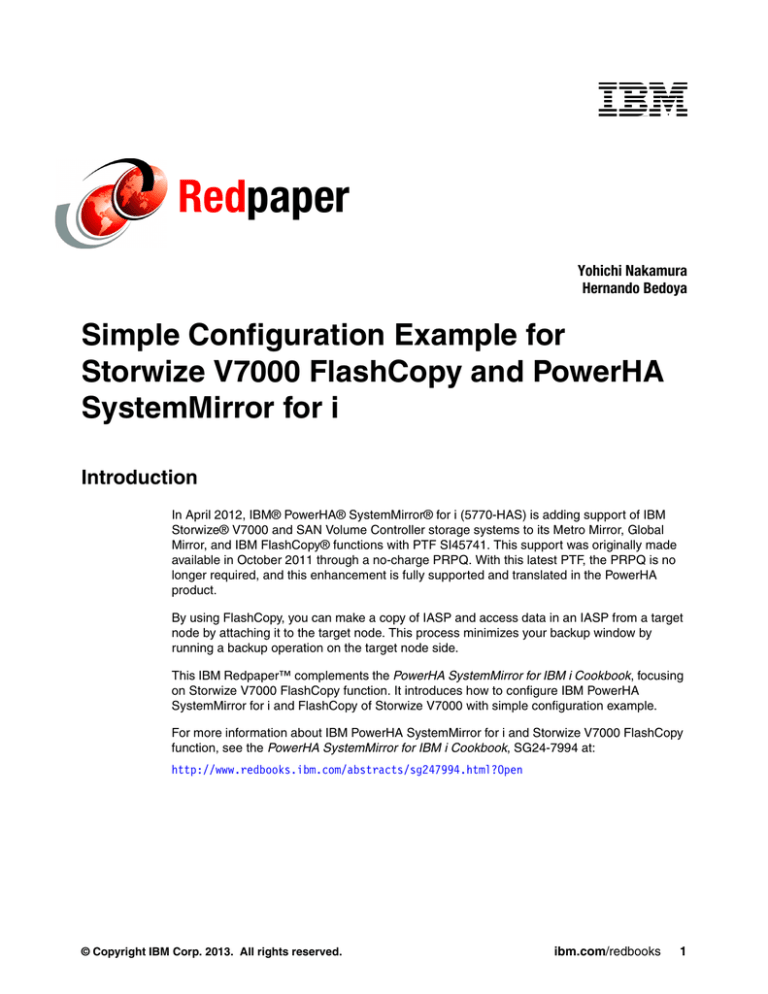
Redpaper
Yohichi Nakamura
Hernando Bedoya
Simple Configuration Example for
Storwize V7000 FlashCopy and PowerHA
SystemMirror for i
Introduction
In April 2012, IBM® PowerHA® SystemMirror® for i (5770-HAS) is adding support of IBM
Storwize® V7000 and SAN Volume Controller storage systems to its Metro Mirror, Global
Mirror, and IBM FlashCopy® functions with PTF SI45741. This support was originally made
available in October 2011 through a no-charge PRPQ. With this latest PTF, the PRPQ is no
longer required, and this enhancement is fully supported and translated in the PowerHA
product.
By using FlashCopy, you can make a copy of IASP and access data in an IASP from a target
node by attaching it to the target node. This process minimizes your backup window by
running a backup operation on the target node side.
This IBM Redpaper™ complements the PowerHA SystemMirror for IBM i Cookbook, focusing
on Storwize V7000 FlashCopy function. It introduces how to configure IBM PowerHA
SystemMirror for i and FlashCopy of Storwize V7000 with simple configuration example.
For more information about IBM PowerHA SystemMirror for i and Storwize V7000 FlashCopy
function, see the PowerHA SystemMirror for IBM i Cookbook, SG24-7994 at:
http://www.redbooks.ibm.com/abstracts/sg247994.html?Open
© Copyright IBM Corp. 2013. All rights reserved.
ibm.com/redbooks
1
Software Prerequisites for IBM PowerHA SystemMirror for i and
Storwize V7000 FlashCopy
Configuring IBM PowerHA SystemMirror for i and Storwize V7000 FlashCopy has these
software prerequisites:
IBM i 7.1 TR3 or later
Portable Utilities for IBM i (5733-SC1)
IBM PowerHA SystemMirror for i Standard Edition or Enterprise Edition (5770-HAS)
PTF 5770-HAS SI45741, which is included in High Availability PTF Group SF99706 Level
1
Both the source node and a target node must satisfy all of these prerequisites.
Sample Environment Overview
Figure 1 on page 3 shows the sample environment that is used in the rest of this IBM
Redpaper. There are two IBM i partitions within a single Power Systems™ server. One of
these is for production use, and the other is for backup operations. The IBM i partition for
production use is called the “source node”, and the one for backup operation is the “target
node”. Both IBM i partitions are hosted by VIOS because this is a requirement on IBM i to use
logical drives within Storwize V7000.
Each IBM i partition has two disk drives. One disk is 75 GB and for a System ASP, and
another disk is 25 GB and for an IASP that is called “IASP01”.
2
Simple Configuration Example for Storwize V7000 FlashCopy and PowerHA SystemMirror for i
Cluster Name: CLUSTER
Device Domain: DEVDMN
Production use
Partition: ITSOPROD
VIOS #1
hdisk1 hdisk2 hdisk3 hdisk4
IASP
FC
System
ASP
IASP
"IASP 01"
IASP
"IASP 01"
IASP
IASP
VSCSi
VSCSi
IASP
VSCSi
VSCSi
VSCSi
Backup operation use
Partition: ITSOBKUP
System
ASP
VIOS #2
hdisk4 hdisk3 hdisk2 hdisk1
IASP
VSCSi
IASP
VSCSi
VSCSi
FC
Hypervisor
Power Systems Server
SAN switch
ITSOPROD_
ITSOPROD_
System ASP
IASP
(=hdisk1 on VIOS) (=hdisk2 on VIOS)
Storwize V7000
75 GB
25 GB
ITSOBKUP_
ITSOBKUP_
IASP
System ASP
(=hdisk4 on VIOS) (=hdisk3 on VIOS)
25 GB
75 GB
Figure 1 Overview of the sample environment for IBM PowerHA SystemMirror for i and Storwize V7000 FlashCopy
Table 1 lists the settings of this scenario.
Table 1 Settings for the FlashCopy scenario
Source Node
Target Node
Purpose
Production use
Running a backup operation
System Name
ITSOPROD
ITSOBKUP
Cluster name
CLUSTER
Device domain
DEVDMN
Cluster node name
ITSOPROD
ITSOBKUP
Cluster interface IP address
192.168.71.56
192.168.71.57
IASP name
IASP01
IASP01
RDBDIRE for IASP
IASP01
IASP01
Copy description name
FLC_PROD
FLC_BKUP
SAN Volume Controller session
name
Storwize V7000 IP address
FLC_SSN
192.168.71.17
Simple Configuration Example for Storwize V7000 FlashCopy and PowerHA SystemMirror for i
3
Source Node
Storwize V7000 user ID
itsouser
SSH key file location
Volume IDs for volumes to be
FlashCopy
Target Node
/QIBM/UserData/HASM/hads/.ssh/id_rsa
9
10
Setting up an IBM i and Storwize V7000 FlashCopy environment
To configure IBM PowerHA SystemMirror for i and Storwize V7000 FlashCopy, complete the
following steps:
1. Configuring IBM i clustering
2. Setting up SSH connection settings between IBM i and Storwize V7000
3. Configuring an IASP on the source node
4. Initializing disk drives and creating an IASP device description on the target node
5. Configuring ASP copy descriptions for Storwize V7000 FlashCopy
Configuring IBM i clustering
You can create a clone IASP in a blank on a Storwize V7000 by using FlashCopy function.
However, you cannot access data by just attaching the clone IASP to your source system.
Instead, configure an IBM i clustering environment and attach the clone IASP to a target
system.
To configure IBM i clustering between the source and target nodes, complete these steps:
1. On both of nodes, run CHGNETA command to allow it to participate a IBM i cluster
environment:
CHGNETA ALWADDCLU(*ANY)
2. On both of nodes, run STRTCPSVR command to start *INETD, if not started yet. *INETD
is set to auto-start by default:
STRTCPSVR SERVER(*INETD)
3. On the source node, run CRTCLU command to create a IBM i cluster that is named
CLUSTER, and register both of nodes to this cluster:
CRTCLU CLUSTER(CLUSTER) NODE((ITSOPROD ('192.168.71.56')) (ITSOBKUP
('192.168.71.57')))
4. On the source node, run the STRCLUNOD command twice to start cluster nodes:
STRCLUNOD CLUSTER(CLUSTER) NODE(ITSOPROD)
STRCLUNOD CLUSTER(CLUSTER) NODE(ITSOBKUP)
5. On the source node, run ADDDEVDMNE command to register the production cluster node
to the device domain that is named “DEVDMN”:
ADDDEVDMNE CLUSTER(CLUSTER) DEVDMN(DEVDMN) NODE(ITSOPROD)
6. On the source node, run the ADDDEVDMNE command to register the backup cluster
node to the device domain that is named “DEVDMN”:
ADDDEVDMNE CLUSTER(CLUSTER) DEVDMN(DEVDMN) NODE(ITSOBKUP)
4
Simple Configuration Example for Storwize V7000 FlashCopy and PowerHA SystemMirror for i
Setting up SSH connection settings between IBM i and Storwize V7000
IBM i and Storwize V7000 are connected through SSH. IBM PowerHA SystemMirror for i
submits a command to run FlashCopy to Storwize V7000 through this connection.
To establish an SSH connection between IBM i and Storwize V7000, generate an asymmetric
encrypted key pair on the source node. Then register a public key to a user ID of Storwize
V7000, and distribute a private key to the target node. This process allows you to establish an
SSH connection from the target node and the source node.
To set up SSH configuration, complete these steps:
1. On both of nodes, run MKDIR command to create the directory
“/QIBM/UserData/HASM/hads/.ssh”. An SSH key pair is generated into this directory.
MKDIR DIR('/QIBM/UserData/HASM/hads/.ssh')
2. On the source node, run STRQSH to generate an SSH asymmetric encrypted key pair in
QSHELL, as shown in Example 1.
Example 1 Generating an SSH key pair on the source node
> cd /QIBM/UserData/HASM/hads/.ssh
$
> ssh-keygen -t rsa -f id_rsa -N ''
Generating public/private rsa key pair.
Your identification has been saved in id_rsa.
Your public key has been saved in id_rsa.pub.
The key fingerprint is:
3d:66:ae:8a:f6:25:7b:4d:41:80:33:fb:52:48:0f:f2
qsecofr@ITSOPROD.RCHLAND.IBM.COM
$
> ls -la
total: 32 kilobytes
drwx--Sr-x 2 QSECOFR 0
8192 Sep
drwx--Sr-x 3 QSYS
0
8192 Sep
-rw------- 1 QSECOFR 0
1675 Sep
-rw-r--r-- 1 QSECOFR 0
415 Sep
$
26
26
26
26
16:01
15:59
16:01
16:01
.
..
id_rsa
id_rsa.pub
3. You must import the public key into a user of Storwize V7000. The user is then used for
various operations by PowerHA SystemMirror for i.
To import the public key into the user of Storwize V7000, complete these steps:
a. Transfer the public key (id_rsa.pub) from the node source to the workstation where you
started the web GUI of the Storwize V7000.
b. Access the management interface for the Storwize V7000 through a web browser on
your workstation and login to this interface, as shown in Figure 2 on page 6.
Simple Configuration Example for Storwize V7000 FlashCopy and PowerHA SystemMirror for i
5
Figure 2 Storwize V7000 Management GUI
6
Simple Configuration Example for Storwize V7000 FlashCopy and PowerHA SystemMirror for i
c. Select Users option in the User Management menu from the left pane of the
management interface, as shown in Figure 3.
Figure 3 Users option in the User Management menu
Simple Configuration Example for Storwize V7000 FlashCopy and PowerHA SystemMirror for i
7
d. Right-click itsouser and select Properties, as shown in Figure 4.
Figure 4 Starting User Properties
8
Simple Configuration Example for Storwize V7000 FlashCopy and PowerHA SystemMirror for i
e. Specify the path for the id_rsa.pub file on your workstation by clicking Browse for the
SSH Public Key in the User Properties window, then click OK, as shown in Figure 5.
Figure 5 Setting an SSH Public Key to a user
4. Distribute the private key to the directory “/QIBM/UserData/HASM/hads/.ssh” on the target
node to establish an SSH connection from the target node.
Simple Configuration Example for Storwize V7000 FlashCopy and PowerHA SystemMirror for i
9
Configuring an IASP on the source node
To configure an IASP, you can use either the CFGDEVASP command or IBM Navigator for i,
and System i® Navigator. In this scenario, configure the IASP, which is named IASP01 and
consists of a logical drive in Storwize V7000, on the production node:
1. Configure the IASP by using the CFGDEVASP command, as shown in Figure 6:
CFGDEVASP ASPDEV(IASP01) ACTION(*CREATE) TYPE(*PRIMARY) UNITS(*SELECT)
Configure Device ASP (CFGDEVASP)
Type choices, press Enter.
ASP device
Action . .
ASP type .
Protection
Encryption
Disk units
.
.
.
.
.
.
.
.
.
.
.
.
.
.
.
.
.
.
+
. .
. .
. .
. .
. .
. .
for
. . . . . .
. . . . . .
. . . . . .
. . . . . .
. . . . . .
. . . . . .
more values
> IASP01
> *CREATE
> *PRIMARY
*NO
*NO
> *SELECT
Name
*CREATE, *DELETE
*PRIMARY, *SECONDARY, *UDFS
*NO, *YES
*NO, *YES
Name, *SELECT
Figure 6 CFGDEVASP command
2. In the Select Non-Configured Disk Units panel, select disk drives that comprise an IASP. In
this scenario, specify “1 (=Select)” for the option DHP002 and press Enter, as shown in
Figure 7.
Select Non-Configured Disk Units
ASP device . . . . . . . . . . . . . . . :
Selected capacity . . . . . . . . . . . :
Selected disk units . . . . . . . . . . :
IASP01
0
0
Type options, press Enter.
1=Select
Resource
Opt Name
1 DPH002
Serial Number
Y2HE7QPFZVBA
Type Model
6B22 0050
Capacity Rank
23860 002
Eligible
Yes
Figure 7 Select Non-Configured Disk Units panel
The configuration of the IASP process starts. You can see the configuration status in the
message area of the panel, as shown in Figure 8.
Bottom
F1=Help F9=Calculate Selection F11=View 2 F12=Cancel
Configuration of ASP device IASP01 is 3% complete.
Figure 8 Configuration status message
10
Simple Configuration Example for Storwize V7000 FlashCopy and PowerHA SystemMirror for i
After the configuration process is completed, the completion message MSGID CPCB719
is displayed, as shown in Figure 9.
F3=Exit F4=Prompt F9=Retrieve F12=Cancel F13=Information Assistant
F23=Set initial menu
Configure Device ASP *CREATE request completed.
Figure 9 Completion message MSGID CPCB719
When you use the CFGDEVASP command to create an IASP, a DEVD for the IASP is also
created automatically. However, an RDBDIRE for the IASP is not created. The RDBDIRE for
the IASP is created automatically when the IASP is varied on for the first time. You can also
add manually by using the ADDRDBDIRE command as shown in Figure 10.
ADDRDBDIRE RDB(IASP01) RMTLOCNAME(*LOOPBACK)
Add RDB Directory Entry (ADDRDBDIRE)
Type choices, press Enter.
Entry:
Relational database . . . . . > IASP01
Relational database alias . .
*NONE
Remote location:
Name or address . . . . . . . > *LOOPBACK
Type . . . . . . . . . . . . .
Port number or service program
Remote authentication method:
Preferred method . . . . . . .
Allow lower authentication . .
*SNA, *IP
*DRDA
*USRENCPWD
*ALWLOWER
*USRENCPWD, *USRID...
*ALWLOWER, *NOALWLOWER
Figure 10 ADDRDBDIRE command
Initializing disk drives and creating an IASP device description on the target
node
Unlike the source node, you do not need to configure an IASP that consists of logical drives in
Storwize V7000. Instead, you must format drives, which are recognized as DPHxxx and
create an IASP device description.
To format drives and create an IASP device description, complete these steps:
1. Run the STRSST command to start system service tools (SST), specify a service tool
user profile and password, and press Enter.
2. Click option 3 (Work with disk units) → option 3 (Work with disk unit recovery) →
option 2 (Disk unit problem recovery procedures) → option 1 (Initialize and format
disk unit) in SST.
Simple Configuration Example for Storwize V7000 FlashCopy and PowerHA SystemMirror for i
11
3. On the Select Disk Units for Initialize and Format panel, select the disk drives that you
want to initialize. In this scenario, select 1 (=Select) for the option DHP002 and press
Enter, as shown in Figure 11.
Select Disk Units for Initialize and Format
Type option, press Enter.
1=Select
Serial
OPT Unit ASP Number
1
YKZDU6BQZ3PT
Resource
Type Model Name
6B22 050 DPH002
Status
Non-configured
Figure 11 Initialize and formatting disk drives by using SST
4. When the Problem Report panel is displayed, confirm messages and select PF10
(=Ignore problems and continue) to continue processing, as shown in Figure 12.
Problem Report
Note: Some action for the problems listed below may need to
be taken. Please select a problem to display more detailed
information about the problem and to see what possible
action may be taken to correct the problem.
Type option, press Enter.
5=Display Detailed Report
OPT Problem
Cannot determine if unit possibly configured
F3=Exit
F10=Ignore problems and continue
F12=Cancel
Figure 12 Problem Report
5. In the Confirm Initialize and Format Disk Unit panel, select PF10 (=Confirm) to start
initializing.
12
Simple Configuration Example for Storwize V7000 FlashCopy and PowerHA SystemMirror for i
During initializing process, you can see the status of this process in the Function Status
panel, as shown in Figure 13.
Function Status
You selected to initialize and format a disk unit
80 % Complete
Figure 13 Status of initializing process
When the initialization completed, a completion message is displayed, as shown in
Figure 14.
Disk Unit Problem Recovery Procedures
Select one of the following:
1. Initialize and format disk unit
2. Display/change page data
3. Analyze disk unit surface
Selection
F3=Exit F11=Display disk configuration status
Initialize and format completed successfully
F12=Cancel
Figure 14 Initialize completion message
Simple Configuration Example for Storwize V7000 FlashCopy and PowerHA SystemMirror for i
13
6. The resource name of the disk drives has changed from “DPHxxx” to “DDxxx” or
“DMPxxx.” You can see the name by selecting option 3 (Work with disk units) option
1 (Display disk configuration) option 6 (Display disk hardware status) from the
main menu of SST, as shown in Figure 15.
Display Disk Hardware Status
Serial
ASP Unit Number
1
1 YXAQDARA3F78
YKZDU6BQZ3PT
Resource
Type Model Name
6B22 050 DMP001
6B22 050 DMP002
Hardware
Status
Operational
Operational
Figure 15 Display Disk Hardware Status panel
7. Exit SST.
8. Run the CRTDEVASP command to create an IASP device description. You must specify
the same resource name and RDBDIRE as on the source node.
CRTDEVASP DEVD(IASP01) RSRCNAME(IASP01) RDB(IASP01)
Configuring ASP copy descriptions for Storwize V7000 FlashCopy
You must configure an ASP copy description to store the information so you can run Storwize
V7000 FlashCopy on PowerHA SystemMirror for i. Two ASP copy descriptions must be
configured. One is for the IASP on the source node, and the other is for the IASP on the target
node.
To configure ASP copy descriptions, complete these steps:
1. On the source node, run the ADDSVCCPYD command with the parameters specified in
Table 1 on page 3 to configure the ASP copy description for the IASP on the source node,
as shown in Figure 16 on page 15.
ADDSVCCPYD ASPCPY(FLC_PROD) ASPDEV(IASP01) CRG(*NONE) SITE(*NONE)
NODE(ITSOPROD) SVCHOST(itsouser '/QIBM/UserData/HASM/hads/.ssh/id_rsa'
'192.168.71.17') VRTDSKRNG((9 9))
14
Simple Configuration Example for Storwize V7000 FlashCopy and PowerHA SystemMirror for i
Add SVC ASP Copy Description (ADDSVCCPYD)
Type choices, press Enter.
ASP copy . . . . . . . . . . . . > FLC_PROD
Name
ASP device . . . . . . . . . . . > IASP01
Name
Cluster resource group . . . . . > *NONE
Name, *NONE
Cluster resource group site . . > *NONE
Name, *NONE
Node identifier . . . . . . . . > ITSOPROD
Name, *CRG, *NONE
Storage host:
User name . . . . . . . . . . > itsouser
Secure shell key file . . . . > '/QIBM/UserData/HASM/hads/.ssh/id_rsa'
Internet address . . . . . . . > '192.168.71.17'
Virtual disk range:
Range start . . . . . . . . . > 9
Range end . . . . . . . . . . > 9
+ for more values
0-8191
0-8191
Figure 16 ADDSVCCPYD command for the IASP on the source node
2. On the source node, run ADDSVCCPYD with the values specified in Table 1 on page 3 to
each parameter to configure the ASP copy description for the IASP on the target node, as
shown in Figure 17.
ADDSVCCPYD ASPCPY(FLC_BKUP) ASPDEV(IASP01) CRG(*NONE) SITE(*NONE)
NODE(ITSOBKUP) SVCHOST(itsouser '/QIBM/UserData/HASM/hads/.ssh/id_rsa'
'192.168.71.17') VRTDSKRNG((10 10))
Add SVC ASP Copy Description (ADDSVCCPYD)
Type choices, press Enter.
ASP copy . . . . . . . . . . . . > FLC_BKUP
Name
ASP device . . . . . . . . . . . > IASP01
Name
Cluster resource group . . . . . > *NONE
Name, *NONE
Cluster resource group site . . > *NONE
Name, *NONE
Node identifier . . . . . . . . > ITSOBKUP
Name, *CRG, *NONE
Storage host:
User name . . . . . . . . . . > itsouser
Secure shell key file . . . . > '/QIBM/UserData/HASM/hads/.ssh/id_rsa'
Internet address . . . . . . . > '192.168.71.17'
Virtual disk range:
Range start . . . . . . . . . > 10
Range end . . . . . . . . . . > 10
+ for more values
0-8191
0-8191
Figure 17 ADDSVCCPYD command for the IASP on the target node
Simple Configuration Example for Storwize V7000 FlashCopy and PowerHA SystemMirror for i
15
Tip: To create an ASP copy description for Storwize V7000 or SAN Volume Controller,
use the ADDSVCCPYD command. You currently cannot use the ADDASPCPYD
command or IBM Navigator for i interface (October 2012).
3. You can see the ASP copy descriptions that you create by using WRKASPCPYD
command, as shown in Figure 18.
Work with ASP Copy Descriptions
10/03/12
Type options, press Enter.
2=Change copy
4=Remove copy 5=Display copy
24=End session 25=Display session
Opt
ASP
Device
IASP01
IASP01
ASP
Copy
FLC_PROD
FLC_BKUP
ASP
Session
ITSOPROD
16:04:33
22=Change session
Session
Type
*NONE
*NONE
Figure 18 WRKASPCPYD command for listing ASP copy descriptions
Running Storwize V7000 FlashCopy through IBM PowerHA
SystemMirror for i
After you set up an IBM i clustering, an SSH connection, and ASP copy descriptions, you can
use Storwize V7000 FlashCopy function through PowerHA SystemMirror for i. To run
FlashCopy and backup operations on the target node, you must complete these steps.
1. Stopping an access to an IASP on the source node
2. Starting an ASP session for Storwize V7000 FlashCopy
3. Accessing data in IASPs on both the source node and the target node
4. Ending an ASP session for Storwize V7000 FlashCopy
Stopping an access to an IASP on the source node
Before running Storwize V7000 FlashCopy, you must stop the access to the IASP on the
source node. The most reliable way to stop is to vary-off the IASP. You can also use an ASP
quiesce option. A quiesce brings the database to a consistent state by flushing modified data
from main memory to disk and suspending database operations and transactions. The
vary-on of the FlashCopy IASP on the target node will still be abnormal. However, a lengthy
database recovery is avoided, which makes the vary-on process shorter. This operation must
be run on the source node.
In this scenario, run the CHGASPACT command on the source node with the following values
to quiesce the IASP, as shown in Figure 19 on page 17.
CHGASPACT ASPDEV(IASP01) OPTION(*SUSPEND) SSPTIMO(60)
16
Simple Configuration Example for Storwize V7000 FlashCopy and PowerHA SystemMirror for i
Change ASP Activity (CHGASPACT)
Type choices, press Enter.
ASP device . . . . . .
Option . . . . . . . .
Suspend timeout . . .
Suspend timeout action
.
.
.
.
.
.
.
.
.
.
.
.
.
.
.
.
. > IASP01
. > *SUSPEND
. > 60
. *CONT
Name, *SYSBAS
*SUSPEND, *RESUME, *FRCWRT
Number
*CONT, *END
Figure 19 CHGASPACT command to quiesce an IASP
After you vary-off or quiesce an IASP, you can start an ASP session for FlashCopy.
Starting an ASP session for Storwize V7000 FlashCopy
When you run Storwize V7000 FlashCopy by using PowerHA SystemMirror for i, you must run
the STRSVCSSN command on the target node. By running STRSVCSSN on the target node,
PowerHA SystemMirror for i makes an SSH connection to Storwize V7000. The
QHAUSRPRF user profile and the information that is defined in ASP copy description is used
to make a connection and run FlashCopy on the Storwize V7000.
In this scenario, run the STRSVCSSN command on the target node with the following values,
as shown in Figure 20.
STRSVCSSN SSN(FLC_SSN) TYPE(*FLASHCOPY) ASPCPY((FLC_PROD FLC_BKUP))
Start SVC Session (STRSVCSSN)
Type choices, press Enter.
Session . . . . . . . . . . . .
Session type . . . . . . . . . .
ASP copy:
Preferred source . . . . . . .
Preferred target . . . . . . .
+ for more values
Incremental flash . . . . . . .
Copy rate . . . . . . . . . . .
Cleaning rate . . . . . . . . .
Grain size . . . . . . . . . . .
Consistency group . . . . . . .
Reverse consistency group . . .
> FLC_SSN
> *FLASHCOPY
Name
*METROMIR, *GLOBALMIR...
> FLC_PROD
> FLC_BKUP
Name
Name
*NO
0
0
256
*GEN
*GEN
*NO, *YES
0-100
0-100
256, 64
Figure 20 STRSVCSSN command
In STRSVCSSN, you can specify the value of the copy rate and the cleaning rate. These
values affect the data rate of the background copy and the cleaning process. These data
rates are determined by the combination of the copy rate, the cleaning rate, and the grain
Simple Configuration Example for Storwize V7000 FlashCopy and PowerHA SystemMirror for i
17
size. If you specify a copy rate of 0, FlashCopy with the nocopy option is run on Storwize
V7000. For more information about the copy rate, the cleaning rate and the grain size, see the
Storwize V7000 Information Center at:
http://pic.dhe.ibm.com/infocenter/storwize/unified_ic/topic/com.ibm.storwize.v7000
.unified.doc/svc_flashcopybackgroundcopy_4iry45.html
And you can also use an incremental FlashCopy function through PowerHA SystemMirror
for i. The incremental flash option is available in the STRSVCSSN command. For more
information about incremental FlashCopy and PowerHA SystemMirror for i, see “Incremental
FlashCopy and PowerHA SystemMirror for i” on page 21.
When the STRSVCSSN command is run correctly, you see the completion message MSGID
HAC002B, as shown in Figure 21. You can then vary on the IASP on the target node.
F3=Exit F4=Prompt F9=Retrieve F12=Cancel
F23=Set initial menu
Command STRSVCSSN completed successfully.
F13=Information Assistant
Figure 21 Completion message for STRSVCSSN
Remember: If the user profile QHAUSRPRF does not have adequate authority for the
SSH private key id_rsa in the directory /QIBM/UserData/HASM/hads/.ssh, STRSVCSSN
with MSGID HAE2041 might fail.
After the STRSVCSSN command completes, you can access data in IASPs on both the
source node and the target node independently.
18
Simple Configuration Example for Storwize V7000 FlashCopy and PowerHA SystemMirror for i
Displaying an ASP session for Storwize V7000 FlashCopy
To confirm the status of FlashCopy, run the following DSPSVCSSN command on the target
node, as shown in Figure 22.
DSPSVCSSN SSN(FLC_SSN)
Display SVC Session
10/04/12
Session . . . . . . . . . . . . . . . . . . :
Type . . . . . . . . . . . . . . . . . . . :
FLC_SSN
*FLASHCOPY
Incremental flash . . . .
Copy rate . . . . . . . .
Cleaning rate . . . . . .
Grain size (KB) . . . . .
Consistency group . . . .
Reverse consistency group
Storage cluster name . .
*NO
0
0
256
fccstgrp1
fccstgrp0
Storwize V7000-2076-
.
.
.
.
.
.
.
.
.
.
.
.
.
.
.
.
.
.
.
.
.
.
.
.
.
.
.
.
.
.
.
.
.
.
.
.
.
.
.
.
.
.
.
.
.
.
.
.
.
.
.
.
.
.
.
.
.
.
.
.
.
.
.
:
:
:
:
:
:
:
ITSOBKUP
13:29:31
Bottom
Copy Descriptions
ASP
device
IASP01
ASP copy
name
FLC_PROD
FLC_BKUP
Role
SOURCE
TARGET
ASP
Status
UNKNOWN
VARYOFF
Replication
state
Node
ACTIVE
ITSOPROD
ITSOBKUP
Bottom
Copy Descriptions
ASP
device
IASP01
Role
SOURCE
TARGET
Copy
Node
progress
ITSOPROD
0
ITSOBKUP
Storage state
Copying
Bottom
Figure 22 Result of DSPSVCSSN command
The ASP status for the source node is always UNKNOWN because the target node cannot
determine the ASP status for the source node. The ASP status for the target node is
VARYOFF, but after you vary on the IASP, the status comes up to AVAILABLE. If you specified
a copy rate greater than 0 in the STRSVCSSN command, you can check up the actual
background copy progress as “Copy progress”.
Simple Configuration Example for Storwize V7000 FlashCopy and PowerHA SystemMirror for i
19
You can see the status of FlashCopy by clicking Copy Services → FlashCopy in the web
management interface of Storwize V7000, as shown in Figure 23.
Figure 23 FlashCopy status in the Storwize V7000 management interface
Accessing data in IASPs on both the source node and the target node
During an ASP session for FlashCopy, you can vary-on the IASPs on the source node and the
target node independently. You can run the production application on the source node and
run a data backup operation on the target node simultaneously.
If you stop an access to an IASP on the source node before STRSVCSSN by using a
varying-off operation, you can simply vary-on the IASP again to allow access. If you used an
IASP quiesce option, you can allow access to this IASP by using the CHGASPACT command
with the *RESUME option, as shown in Figure 24.
CHGASPACT ASPDEV(IASP01) OPTION(*RESUME)
Change ASP Activity (CHGASPACT)
Type choices, press Enter.
ASP device . . . . . . . . . . . > IASP01
Option . . . . . . . . . . . . . > *RESUME
Name, *SYSBAS
*SUSPEND, *RESUME, *FRCWRT
Figure 24 CHGASPACT command with *RESUME option
20
Simple Configuration Example for Storwize V7000 FlashCopy and PowerHA SystemMirror for i
You can also access a FlashCopy IASP on the target node by varying-on the IASP on the
target node. Then, you can run your data backup operation on that node.
Ending an ASP session for Storwize V7000 FlashCopy
After you finish your data backup operation on the target node, you can end an ASP session
for Storwize V7000 FlashCopy by using ENDSVCSSN on the target node, as shown in
Figure 25.
ENDSVCSSN SSN(FLC_SSN)
End SVC ASP Session (ENDSVCSSN)
Type choices, press Enter.
Session . . . . . . . . . . . . > FLC_SSN
Delete consistency group . . . .
*YES
Name
*YES, *NO
Figure 25 ENDSVCSSN command
You can choose to delete the consistency group when running ENDSVCSSN. After you run
ENDSVCSSN, disk drives in a FlashCopy IASP become non-configured disk units on IBM i.
You can no longer use data in a FlashCopy IASP on the target node.
Other topics about Storwize V7000 FlashCopy and PowerHA
SystemMirror for i
This section details topics about Storwize V7000 FlashCopy and PowerHA SystemMirror for i
that do not fit in the other sections.
Incremental FlashCopy and PowerHA SystemMirror for i
You can use an incremental FlashCopy function with PowerHA SystemMirror for i and normal
FlashCopy function. By using incremental FlashCopy, you can reduce amount of cloning data.
The function copies data from source node volumes to target node volumes that have been
modified since the initial creation of the FlashCopy or the last time an increment operation
was performed.
Simple Configuration Example for Storwize V7000 FlashCopy and PowerHA SystemMirror for i
21
To use an incremental FlashCopy function, you must start an ASP session by using the
STRSVCSSN command with INCR(*YES) option. You must also specify a value for the
CPYRATE option greater than 0 as an initial FlashCopy. And you must keep this ASP session
active. The example for the STRSVCSSN command is shown in Figure 26.
STRSVCSSN SSN(FLC_SSN) TYPE(*FLASHCOPY) ASPCPY((FLC_PROD FLC_BKUP)) INCR(*YES)
CPYRATE(100)
Start SVC Session (STRSVCSSN)
Type choices, press Enter.
Session . . . . . . . . . . . .
Session type . . . . . . . . . .
ASP copy:
Preferred source . . . . . . .
Preferred target . . . . . . .
+ for more values
Incremental flash . . . . . . .
Copy rate . . . . . . . . . . .
Cleaning rate . . . . . . . . .
Grain size . . . . . . . . . . .
Consistency group . . . . . . .
Reverse consistency group . . .
> FLC_SSN
> *FLASHCOPY
Name
*METROMIR, *GLOBALMIR...
> FLC_PROD
> FLC_BKUP
Name
Name
> *YES
> 100
0
256
*GEN
*GEN
*NO, *YES
0-100
0-100
256, 64
Figure 26 STRSVCSSN command for an initial incremental FlashCopy
You can run an incremental FlashCopy, by using CHGSVCSSN command with
OPTION(*INCR) specified on the target node:
CHGSVCSSN SSN(FLC_SSN) OPTION(*INCR)
22
Simple Configuration Example for Storwize V7000 FlashCopy and PowerHA SystemMirror for i
Before you run CHGSVCSSN for an incremental FlashCopy, You must complete the
background copy of the initial FlashCopy or the last incremental FlashCopy. You can check
the status of the background copy by using the DSPSVCSSN command as shown in
Figure 27.
Display SVC Session
ITSOBKUP
10/05/12
13:26:22
Session . . . . . . . . . . . . . . . . . . :
Type . . . . . . . . . . . . . . . . . . . :
FLC_SSN
*FLASHCOPY
Incremental flash . . . .
Copy rate . . . . . . . .
Cleaning rate . . . . . .
Grain size (KB) . . . . .
Consistency group . . . .
Reverse consistency group
Storage cluster name . .
*YES
100
0
256
fccstgrp1
fccstgrp0
Storwize V7000-2076-
.
.
.
.
.
.
.
.
.
.
.
.
.
.
.
.
.
.
.
.
.
.
.
.
.
.
.
.
.
.
.
.
.
.
.
.
.
.
.
.
.
.
.
.
.
.
.
.
.
.
.
.
.
.
.
.
.
.
.
.
.
.
.
:
:
:
:
:
:
:
Bottom
Copy Descriptions
ASP
device
IASP01
Role
SOURCE
TARGET
Copy
Node
progress
ITSOPROD
100
ITSOBKUP
Storage state
Idle or copied
Figure 27 Result of DSPPSVCSSN command for an incremental FlashCopy
If you run CHGSVCSSN with OPTION(*INCR) while the background copy is running, the
CHGSVCSSN fails with MSGID HAE2057, which mentions CMMVC5907E, as shown in
Figure 28.
Additional Message Information
Message ID . . . . . . :
Message type . . . . . :
Date sent . . . . . . :
HAE2057
Diagnostic
10/05/12
Severity . . . . . . . :
30
Time sent . . . . . . :
13:13:29
Message . . . . : An error has error has been returned by the storage
subsystem.
Cause . . . . . : The storage subsytem has returned an error. The error
details are:
CMMVC5907E The FlashCopy mapping or consistency group was not started
because the mapping or consistency group is already in the copying state.
Recovery . . . : Refer to the IBM Information Center for the storage
subsystem for error details and recovery actions.
Figure 28 Failure message of CHGSVCSSN command for an incremental FlashCopy
The incremental FlashCopy can be started only by using CHGSVCSSN command. Therefore,
the initial ASP session for FlashCopy must be kept active while you run an incremental
FlashCopy. After you end the initial ASP session by using ENDSVCSSN command on the
target node, you no longer run the incremental FlashCopy. You must then start an ASP
Simple Configuration Example for Storwize V7000 FlashCopy and PowerHA SystemMirror for i
23
session for an initial FlashCopy by using the STRSVCSSN command with INCR(*YES) option
again.
Before you run the incremental FlashCopy by using CHGSVCSSN, stop the access to the
IASP on the source as it is done for a normal FlashCopy. For more information about stopping
an access to the IASP on the source node, see “Stopping an access to an IASP on the
source node” on page 16.
Reverse FlashCopy and PowerHA SystemMirror for i
You can also use the reverse FlashCopy function in Storwize V7000 with PowerHA
SystemMirror for i. By using the reverse FlashCopy, you can replace an entire IASP on the
source node with data in a FlashCopy IASP on the target node. To use this function, you must
start an ASP session for a normal FlashCopy by using STRSVCSSN with a CPYRATE option
greater than 0 specified. And you also must keep this ASP session active.
To perform the reverse FlashCopy through PowerHA SystemMirror for i, complete these
steps:
1. Perform a normal FlashCopy operation as described from “Stopping an access to an IASP
on the source node” on page 16 to “Accessing data in IASPs on both the source node and
the target node” on page 20. Use this command to start the ASP session with the
background copy:
STRSVCSSN SSN(FLC_SSN) TYPE(*FLASHCOPY) ASPCPY((FLC_PROD FLC_BKUP))
CPYRATE(100)
Do not end the ASP session by using ENDSVCSSN. If you do so, you can no longer run
the reverse FlashCopy.
2. To replace whole data in the IASP on the source node, vary-off the IASP on the source
node.
3. Vary-off or quiesce the IASP on the target node, and then establish the checkpoint of the
IASP on the target node.
4. On the source node, run CHGSVCSSN command with OPTION(*REVERSE) specified,
as shown in Figure 29.
CHGSVCSSN SSN(FLC_SSN) OPTION(*REVERSE)
Change SVC Session (CHGSVCSSN)
Type choices, press Enter.
Session . . . . . . . . . . . . > FLC_SSN
Option . . . . . . . . . . . . . > *REVERSE
Name
*CHGATTR, *SUSPEND...
Figure 29 Running the reverse FlashCopy by using CHGSVCSSN command
Even if you have run the reverse FlashCopy from the target node to the source node in the
certain ASP session, you must run ENDSVCSSN on the target node when you end this ASP
session.
24
Simple Configuration Example for Storwize V7000 FlashCopy and PowerHA SystemMirror for i
Operation Example for Storwize V7000 FlashCopy and PowerHA SystemMirror
for i
Example 2 shows a CL script to be run from the FlashCopy target node for automating a
FlashCopy backup. It includes quiescing the IASP on the FlashCopy source node ITSOPROD
before starting the FlashCopy session and varying on the IASP on the FlashCopy target node
ITSOBKUP for doing the backup to tape. It then varys off the IASP on the FlashCopy node,
and removes the FlashCopy session again.
Example 2 CHGASPACT run from the FlashCopy target node for quiescing an IASP
PGM
RUNRMTCMD CMD('CHGASPACT ASPDEV(IASP01) +
OPTION(*SUSPEND) SSPTIMO(30)') +
RMTLOCNAME(ITSOPROD *IP) RMTUSER(ITSOUSER) +
RMTPWD(XXXXXXXX)
STRSVCSSN SSN(FLC_SSN) TYPE(*FLASHCOPY) +
ASPCPY((FLC_PROD FLC_BKUP))
RUNRMTCMD CMD('CHGASPACT ASPDEV(IASP01) +
OPTION(*RESUME)') +
RMTLOCNAME(ITSOPROD *IP) RMTUSER(ITSOUSER) +
RMTPWD(XXXXXXXX)
VRYCFG CFGOBJ(IASP01) CFGTYPE(*DEV) STATUS(*ON)
/* INSERT CALL OF YOUR BACKUP PROGRAMS HERE */
VRYCFG CFGOBJ(IASP01) CFGTYPE(*DEV) STATUS(*OFF)
ENDSVCSSN SSN(FLC_SSN)
ENDPGM
The team who wrote this paper
This paper was produced by a team of specialists from around the world working at the
International Technical Support Organization, Rochester Center.
Yohichi Nakamura is an Advisory IT Specialist. He joined IBM Japan Systems
Engineering Co., Ltd., which is a subsidiary of IBM Japan, as IBM i Advanced
Technical Support in 2003. He temporary moved to IBM Japan as a Technical
Sales Specialist for Power Systems and IBM i in 2010. He now holds both FTSS
and ATS roles, so he provides mainly pre-sales technical support especially
cutting-edge solutions for Power Systems, IBM i. His areas of expertise include
virtualization, external storage, iSCSI integration solutions, high availability,
performance analysis, backup/recovery, and overall of IBM i operations.
Simple Configuration Example for Storwize V7000 FlashCopy and PowerHA SystemMirror for i
25
Hernando Bedoya is a Senior IT Specialist at STG Lab Services and Training,
in Rochester, Minnesota. He writes extensively and teaches IBM classes
worldwide in all areas of DB2® for i. Before joining STG Lab Services, he
worked in the ITSO for nine years writing multiple IBM Redbooks® publications.
He also worked for IBM Colombia as an IBM AS/400® IT Specialist doing
presales support for the Andean countries. He has 28 years of experience in the
computing field, and has taught database classes in Colombian universities. His
areas of expertise are database technology, performance, and data
warehousing. He holds a Master’s degree in Computer Science from EAFIT,
Colombia.
Thanks to the following people for their contributions to this project:
Linda Robinson
International Technical Support Organization, Rochester Center
Jenny Dervin
James A. Lembke
IBM Rochester
Now you can become a published author, too!
Here’s an opportunity to spotlight your skills, grow your career, and become a published
author—all at the same time! Join an ITSO residency project and help write a book in your
area of expertise, while honing your experience using leading-edge technologies. Your efforts
will help to increase product acceptance and customer satisfaction, as you expand your
network of technical contacts and relationships. Residencies run from two to six weeks in
length, and you can participate either in person or as a remote resident working from your
home base.
Find out more about the residency program, browse the residency index, and apply online at:
ibm.com/redbooks/residencies.html
Stay connected to IBM Redbooks
Find us on Facebook:
http://www.facebook.com/IBMRedbooks
Follow us on Twitter:
http://twitter.com/ibmredbooks
Look for us on LinkedIn:
http://www.linkedin.com/groups?home=&gid=2130806
Explore new Redbooks publications, residencies, and workshops with the IBM Redbooks
weekly newsletter:
https://www.redbooks.ibm.com/Redbooks.nsf/subscribe?OpenForm
Stay current on recent Redbooks publications with RSS Feeds:
http://www.redbooks.ibm.com/rss.html
26
Simple Configuration Example for Storwize V7000 FlashCopy and PowerHA SystemMirror for i
Notices
This information was developed for products and services offered in the U.S.A.
IBM may not offer the products, services, or features discussed in this document in other countries. Consult
your local IBM representative for information on the products and services currently available in your area. Any
reference to an IBM product, program, or service is not intended to state or imply that only that IBM product,
program, or service may be used. Any functionally equivalent product, program, or service that does not
infringe any IBM intellectual property right may be used instead. However, it is the user's responsibility to
evaluate and verify the operation of any non-IBM product, program, or service.
IBM may have patents or pending patent applications covering subject matter described in this document. The
furnishing of this document does not grant you any license to these patents. You can send license inquiries, in
writing, to:
IBM Director of Licensing, IBM Corporation, North Castle Drive, Armonk, NY 10504-1785 U.S.A.
The following paragraph does not apply to the United Kingdom or any other country where such
provisions are inconsistent with local law: INTERNATIONAL BUSINESS MACHINES CORPORATION
PROVIDES THIS PUBLICATION "AS IS" WITHOUT WARRANTY OF ANY KIND, EITHER EXPRESS OR
IMPLIED, INCLUDING, BUT NOT LIMITED TO, THE IMPLIED WARRANTIES OF NON-INFRINGEMENT,
MERCHANTABILITY OR FITNESS FOR A PARTICULAR PURPOSE. Some states do not allow disclaimer of
express or implied warranties in certain transactions, therefore, this statement may not apply to you.
This information could include technical inaccuracies or typographical errors. Changes are periodically made
to the information herein; these changes will be incorporated in new editions of the publication. IBM may make
improvements and/or changes in the product(s) and/or the program(s) described in this publication at any time
without notice.
Any references in this information to non-IBM websites are provided for convenience only and do not in any
manner serve as an endorsement of those websites. The materials at those websites are not part of the
materials for this IBM product and use of those websites is at your own risk.
IBM may use or distribute any of the information you supply in any way it believes appropriate without incurring
any obligation to you.
Any performance data contained herein was determined in a controlled environment. Therefore, the results
obtained in other operating environments may vary significantly. Some measurements may have been made
on development-level systems and there is no guarantee that these measurements will be the same on
generally available systems. Furthermore, some measurements may have been estimated through
extrapolation. Actual results may vary. Users of this document should verify the applicable data for their
specific environment.
Information concerning non-IBM products was obtained from the suppliers of those products, their published
announcements or other publicly available sources. IBM has not tested those products and cannot confirm the
accuracy of performance, compatibility or any other claims related to non-IBM products. Questions on the
capabilities of non-IBM products should be addressed to the suppliers of those products.
This information contains examples of data and reports used in daily business operations. To illustrate them
as completely as possible, the examples include the names of individuals, companies, brands, and products.
All of these names are fictitious and any similarity to the names and addresses used by an actual business
enterprise is entirely coincidental.
COPYRIGHT LICENSE:
This information contains sample application programs in source language, which illustrate programming
techniques on various operating platforms. You may copy, modify, and distribute these sample programs in
any form without payment to IBM, for the purposes of developing, using, marketing or distributing application
programs conforming to the application programming interface for the operating platform for which the sample
programs are written. These examples have not been thoroughly tested under all conditions. IBM, therefore,
cannot guarantee or imply reliability, serviceability, or function of these programs.
© Copyright International Business Machines Corporation 2013. All rights reserved.
Note to U.S. Government Users Restricted Rights -- Use, duplication or disclosure restricted by
GSA ADP Schedule Contract with IBM Corp.
27
This document REDP-4923-00 was created or updated on February 25, 2013.
®
Send us your comments in one of the following ways:
Use the online Contact us review Redbooks form found at:
ibm.com/redbooks
Send your comments in an email to:
redbooks@us.ibm.com
Mail your comments to:
IBM Corporation, International Technical Support Organization
Dept. HYTD Mail Station P099
2455 South Road
Poughkeepsie, NY 12601-5400 U.S.A.
Redpaper ™
Trademarks
IBM, the IBM logo, and ibm.com are trademarks or registered trademarks of International Business Machines
Corporation in the United States, other countries, or both. These and other IBM trademarked terms are
marked on their first occurrence in this information with the appropriate symbol (® or ™), indicating US
registered or common law trademarks owned by IBM at the time this information was published. Such
trademarks may also be registered or common law trademarks in other countries. A current list of IBM
trademarks is available on the Web at http://www.ibm.com/legal/copytrade.shtml
The following terms are trademarks of the International Business Machines Corporation in the United States,
other countries, or both:
AS/400®
DB2®
FlashCopy®
IBM®
Power Systems™
PowerHA®
Redbooks®
Redpaper™
Redbooks (logo)
Storwize®
System i®
SystemMirror®
®
The following terms are trademarks of other companies:
Other company, product, or service names may be trademarks or service marks of others.
28
Simple Configuration Example for Storwize V7000 FlashCopy and PowerHA SystemMirror for i
